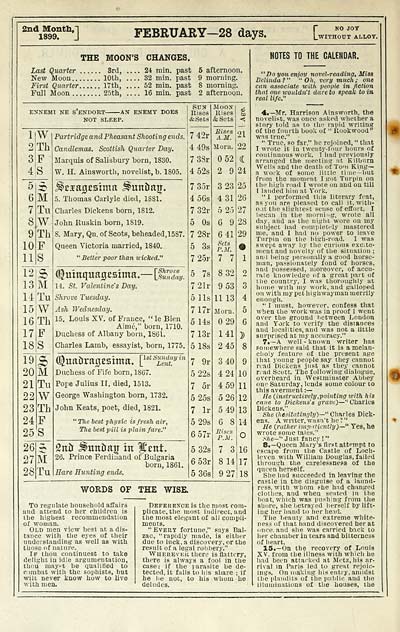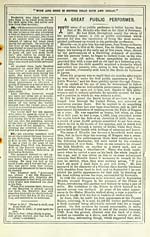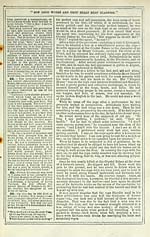Towns > Dalkeith > 1899, 1902 - Carment's directory for Dalkeith and district and year book > 1899
(136)
Download files
Complete book:
Individual page:
Thumbnail gallery: Grid view | List view

2nd Month,!
1899. J
FEBRUARY— 28 days.
tNO JOY
WITHOUT ALLOY.
THE MOON'S CHANGES
Last Quarter 3rd, 24 min. past 5 afternoon.
New Moon 10th, 32 min. past 9 morning.
First Quarter 17th, 52 min. past 8 morning.
Full Moon 25th, .... 16 min. past 2 afternoon.
ENNEMI NE s'eNDORT AN ENEMY DOES
NOT SLEEP.
Sun
Rises
&Sets
Moon
Rises
&Sets
to
<q
21
1
w
Partridge and Pheasant Shooting ends.
7 42r
ItiSfS
A.M.
2
Th
Candlemas. Scottish Quarter Day.
4 49s
Morn.
22
3
F
Marquis of Salisbury born, 1830.
7 3Sr
52
C
4
S
M
W. H. Ainswortli, novelist, b. 1805.
4 52s
7 35r
4 56s
2 9
3 23
4 31
24
25
26
5
6
5. Thomas Carlyle died, 1881.
7
Tu
Charles Dickens born, 1812.
7 32r
5 25
27
8
W
John Ruskin born, 1819.
5 Os
6 9
28
9
Th
8. Mary, Qn. of Scots, beheaded,1587.
7 28r
6 41
29
10
F
Queen Victoria married, 1840.
5 3s
Sets
P.M.
9
11
S
M
"Better poor than uicked."
7 25r
5 7s
7 21r
7 7
8 32
9 53
1
2
3
12
13
dluttiqua^eantta.— [fSy.
14. St. Valentine's Day.
14
Tu
Shrove Tuesday.
5 11s
11 13
4
15
16
17
W
Th
F
Ash Wednesday.
15. Louis XV. of France, " le Bien
Aime," born, 1710.
Duchess of Albany born, 1861.
717r
5 14s
713r
Morn.
29
141
5
6
D
18
S
Charles Lamb, essayist, born, 1775,
5 18s
7 9r
5 22s
2 45
3 40
4 24
8
9
10
19
20
M
(iua5ra0esima. ['^^'^S^™
Duchess of Fife born, 1867.
21
Tu
Pope Julius II. died, 1513.
7 5r
4 59
11
22
W
George Washington born, 1732.
5 25s
5 26
12
23
Th
John Keats, poet, died, 1821.
7 Ir
5 49
13
24
25
F
S
" 2716 best physic is fresh air,
The iest pill is plain fare."
5 29s
6o7r
5 32s
6 53r
5 36s
6 8
Rises
P.M.
7 3
8 14
9 27
14
O
16
17
18
26
27
28
M
Tu
Stttr ^utttra^ itt l^ettt.
26. Prince Ferdinand of Bulgaria
born, 1861.
Hare Hunting ends.
WORDS OF THE WISE.
T
iind
tbe
of -s
tan
und
tbo
n
dell
tbo
cm
wil
wit
)reg
atte
higl
voiiia
LD ni
36 w
ersta
=6 of
^ tlio
glH i
11 m
bat
nev
hme
ilate bousebold affairs
nd to her children is
jest recommendation
n.
en view best at a dis-
th tbe eyes of their
nding as well as with
nature.
u continuest to take
n idle argumentation,
iy>t be qualified to
A'itli tbe sophists, but
er know how to live
a.
Deference
plicate, the n
tbe most eleg
meuts.
"Every fo
zac, "rapidly
due to luck, a
result of a leg
WUEREVEi
there Is alwa
case: if the
tected, it fall
he be not,
deludes.
is the
lost in
ant of
rtune,"
made,
discov
al robb
there
ys a f
paras
3 to bis
to his
most cc
Jirect, s
all com
says I
is eit
ery, or
ery."
is nattc
ool in
te be
sliare
whom
m-
nd
pli-
al-
tier
the
7e
de-
if
he
NOTES TO THE CALENDAR.
"Do you enjoy novel-reading. Miss
Belinda f" "Oh. very much; one
can associate with people in fiction
that one wouldn't dare to speak to in
real life."
4. — ^Mr. Harrison Ainsworth, the
novelist, was once asUed whether a
story told as to the rapid writing
of tbe fourth book of " Rookwood"
wns true."
" True, so far," be rejoined, " that
I wrote it in twenty-four hours of
continuous work. I bad previously
arranged the meeting at Kilburn
Wells and the death of Tom King—
a work of some little time— but
frcim tbe moment I got Turpin on
the high road I wrote on and on till
I landed bim at York.
"I performed this literary feat,
as you are pleased to call it, with-
out the slightest sense of effort. I
liCKan in tbe morning, wrote all
day, and as tbe night wore on my
subject had completely mastered
me, and I had no power to leave
Turpin on the bigb-rnad. I was
swept away by tbe curious excite-
ment and novelty of the situation ;
ami l)eing personally a good horse-
man, passionately fond of horses,
and possessed, moreover, of accu-
rate knowledge of a great part of
the country, I was thoroughly at
home with my work, and galloped
on with my pet highwayman merrily
enough.
'• I must, however, confess that
when the work was in proof I went
over the ground between London
and York to verify the distances
and localities, and was not a little
surprised at my accuracy."
7.— A well - known writer has
somewhere said that it is a melan-
choly feature of the present age
that young people say they cannot
read Dickens just as they cannot
rtad Scott. The following dialogue,
overheard in Westminster Abbey
one Saturday, lends some colour to
this averment :—
He (instructively , pointing loith his
cane to Dickens's £/raye)—" Charles
Dickens."
She (hesitatingly')—" Charles Dick-
ens. A writer, wasn't he ? "
He (rather imp-itiently)—" Yes, he
wrote some tales."
,s7ie— " Just fancy I"
8.— Queen Mary"s first attempt to
escape from the Castle of Loch-
leven with William Douglas, failed
through the carelessness of the
queen herself.
She had succeeded in leaving the
castle in the disguise of a laund-
ress, with whom she had changed
clothes, and when se.ited in the
l)oat, which was pushing from the
shore, she l^etrayed herself by lift-
ing her hand to her bend.
The beauty and extreme white-
ness of that hand discovered her at
once, and she was carried back to
her chamber in tears and bitterness
of heart.
15.— On tbe recovery of Louis
XV. from the illness with which he
bad been attacked at Metz, his ar-
rival in Paris led to great rejoic-
ings. On making his entiy, amidst
the plaudits of the public and the
illuminations of tbe houses, the
1899. J
FEBRUARY— 28 days.
tNO JOY
WITHOUT ALLOY.
THE MOON'S CHANGES
Last Quarter 3rd, 24 min. past 5 afternoon.
New Moon 10th, 32 min. past 9 morning.
First Quarter 17th, 52 min. past 8 morning.
Full Moon 25th, .... 16 min. past 2 afternoon.
ENNEMI NE s'eNDORT AN ENEMY DOES
NOT SLEEP.
Sun
Rises
&Sets
Moon
Rises
&Sets
to
<q
21
1
w
Partridge and Pheasant Shooting ends.
7 42r
ItiSfS
A.M.
2
Th
Candlemas. Scottish Quarter Day.
4 49s
Morn.
22
3
F
Marquis of Salisbury born, 1830.
7 3Sr
52
C
4
S
M
W. H. Ainswortli, novelist, b. 1805.
4 52s
7 35r
4 56s
2 9
3 23
4 31
24
25
26
5
6
5. Thomas Carlyle died, 1881.
7
Tu
Charles Dickens born, 1812.
7 32r
5 25
27
8
W
John Ruskin born, 1819.
5 Os
6 9
28
9
Th
8. Mary, Qn. of Scots, beheaded,1587.
7 28r
6 41
29
10
F
Queen Victoria married, 1840.
5 3s
Sets
P.M.
9
11
S
M
"Better poor than uicked."
7 25r
5 7s
7 21r
7 7
8 32
9 53
1
2
3
12
13
dluttiqua^eantta.— [fSy.
14. St. Valentine's Day.
14
Tu
Shrove Tuesday.
5 11s
11 13
4
15
16
17
W
Th
F
Ash Wednesday.
15. Louis XV. of France, " le Bien
Aime," born, 1710.
Duchess of Albany born, 1861.
717r
5 14s
713r
Morn.
29
141
5
6
D
18
S
Charles Lamb, essayist, born, 1775,
5 18s
7 9r
5 22s
2 45
3 40
4 24
8
9
10
19
20
M
(iua5ra0esima. ['^^'^S^™
Duchess of Fife born, 1867.
21
Tu
Pope Julius II. died, 1513.
7 5r
4 59
11
22
W
George Washington born, 1732.
5 25s
5 26
12
23
Th
John Keats, poet, died, 1821.
7 Ir
5 49
13
24
25
F
S
" 2716 best physic is fresh air,
The iest pill is plain fare."
5 29s
6o7r
5 32s
6 53r
5 36s
6 8
Rises
P.M.
7 3
8 14
9 27
14
O
16
17
18
26
27
28
M
Tu
Stttr ^utttra^ itt l^ettt.
26. Prince Ferdinand of Bulgaria
born, 1861.
Hare Hunting ends.
WORDS OF THE WISE.
T
iind
tbe
of -s
tan
und
tbo
n
dell
tbo
cm
wil
wit
)reg
atte
higl
voiiia
LD ni
36 w
ersta
=6 of
^ tlio
glH i
11 m
bat
nev
hme
ilate bousebold affairs
nd to her children is
jest recommendation
n.
en view best at a dis-
th tbe eyes of their
nding as well as with
nature.
u continuest to take
n idle argumentation,
iy>t be qualified to
A'itli tbe sophists, but
er know how to live
a.
Deference
plicate, the n
tbe most eleg
meuts.
"Every fo
zac, "rapidly
due to luck, a
result of a leg
WUEREVEi
there Is alwa
case: if the
tected, it fall
he be not,
deludes.
is the
lost in
ant of
rtune,"
made,
discov
al robb
there
ys a f
paras
3 to bis
to his
most cc
Jirect, s
all com
says I
is eit
ery, or
ery."
is nattc
ool in
te be
sliare
whom
m-
nd
pli-
al-
tier
the
7e
de-
if
he
NOTES TO THE CALENDAR.
"Do you enjoy novel-reading. Miss
Belinda f" "Oh. very much; one
can associate with people in fiction
that one wouldn't dare to speak to in
real life."
4. — ^Mr. Harrison Ainsworth, the
novelist, was once asUed whether a
story told as to the rapid writing
of tbe fourth book of " Rookwood"
wns true."
" True, so far," be rejoined, " that
I wrote it in twenty-four hours of
continuous work. I bad previously
arranged the meeting at Kilburn
Wells and the death of Tom King—
a work of some little time— but
frcim tbe moment I got Turpin on
the high road I wrote on and on till
I landed bim at York.
"I performed this literary feat,
as you are pleased to call it, with-
out the slightest sense of effort. I
liCKan in tbe morning, wrote all
day, and as tbe night wore on my
subject had completely mastered
me, and I had no power to leave
Turpin on the bigb-rnad. I was
swept away by tbe curious excite-
ment and novelty of the situation ;
ami l)eing personally a good horse-
man, passionately fond of horses,
and possessed, moreover, of accu-
rate knowledge of a great part of
the country, I was thoroughly at
home with my work, and galloped
on with my pet highwayman merrily
enough.
'• I must, however, confess that
when the work was in proof I went
over the ground between London
and York to verify the distances
and localities, and was not a little
surprised at my accuracy."
7.— A well - known writer has
somewhere said that it is a melan-
choly feature of the present age
that young people say they cannot
read Dickens just as they cannot
rtad Scott. The following dialogue,
overheard in Westminster Abbey
one Saturday, lends some colour to
this averment :—
He (instructively , pointing loith his
cane to Dickens's £/raye)—" Charles
Dickens."
She (hesitatingly')—" Charles Dick-
ens. A writer, wasn't he ? "
He (rather imp-itiently)—" Yes, he
wrote some tales."
,s7ie— " Just fancy I"
8.— Queen Mary"s first attempt to
escape from the Castle of Loch-
leven with William Douglas, failed
through the carelessness of the
queen herself.
She had succeeded in leaving the
castle in the disguise of a laund-
ress, with whom she had changed
clothes, and when se.ited in the
l)oat, which was pushing from the
shore, she l^etrayed herself by lift-
ing her hand to her bend.
The beauty and extreme white-
ness of that hand discovered her at
once, and she was carried back to
her chamber in tears and bitterness
of heart.
15.— On tbe recovery of Louis
XV. from the illness with which he
bad been attacked at Metz, his ar-
rival in Paris led to great rejoic-
ings. On making his entiy, amidst
the plaudits of the public and the
illuminations of tbe houses, the
Set display mode to: Large image | Transcription
Images and transcriptions on this page, including medium image downloads, may be used under the Creative Commons Attribution 4.0 International Licence unless otherwise stated. ![]()
| Scottish Post Office Directories > Towns > Dalkeith > Carment's directory for Dalkeith and district and year book > 1899 > (136) |
|---|
| Permanent URL | https://digital.nls.uk/86551268 |
|---|
| Description | Annual. Published 1899-1902. Preceded by: Carment's ... directory for Dalkeith and district. |
|---|---|
| Shelfmark | 5.1429 |
| Additional NLS resources: |
| Description | Directories of individual Scottish towns and their suburbs. |
|---|
| Description | Around 700 Scottish directories published annually by the Post Office or private publishers between 1773 and 1911. Most of Scotland covered, with a focus on Edinburgh, Glasgow, Dundee and Aberdeen. Most volumes include a general directory (A-Z by surname), street directory (A-Z by street) and trade directory (A-Z by trade). |
|---|


